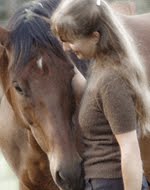
Today I watched the movie Gandhi. His message of nonviolence sounded like it could have been learned from the horses themselves.
In one part of the movie Gandhi meets a white Christian priest, Charlie Andrews. They are in South Africa at the turn of the century. It was a time when any colored person, Indian included, walking down a street with a white was likely to be beaten for threatening the status of the superiority of whites. As they walked down the street approaching some young men with trouble on their faces, Gandhi says to Charlie;
In one part of the movie Gandhi meets a white Christian priest, Charlie Andrews. They are in South Africa at the turn of the century. It was a time when any colored person, Indian included, walking down a street with a white was likely to be beaten for threatening the status of the superiority of whites. As they walked down the street approaching some young men with trouble on their faces, Gandhi says to Charlie;
"Doesn't the New Testament say, 'If your enemy strikes you on the right cheek, offer him the left?'"
"I think perhaps the phrase was used metaphorically. I don't think..."
"I'm not so sure. I have thought about it a great deal and I suspect he meant you must show courage. Be willing to take a blow, several blows to show you will not strike back, nor will you be turned aside. And when you do that, it calls on something in human nature, something that makes his hatred for you decrease and his respect increase. I think Christ grasped that and I have seen it work."
"I think perhaps the phrase was used metaphorically. I don't think..."
"I'm not so sure. I have thought about it a great deal and I suspect he meant you must show courage. Be willing to take a blow, several blows to show you will not strike back, nor will you be turned aside. And when you do that, it calls on something in human nature, something that makes his hatred for you decrease and his respect increase. I think Christ grasped that and I have seen it work."

 Again, in Gandhi's words;
Again, in Gandhi's words;"I am asking you to fight against their anger, not to provoke it. We will not strike a blow; but we will receive them and through our pain we will make them see their injustice and it will hurt, as all fighting hurts; but we cannot lose. We cannot. They may torture my body, break my bones, even kill me. Then they will have my dead body. Not my obedience."
And I will add; not my love.
The flowering is upon us.




Thank you for that lovely meditation on non-violence and our relationship to others. Very well said. Many blessings upon you and your horses, and your journey together.
ReplyDeleteHilary
Oh look at that happy Sofi face.
ReplyDeleteAlso, Ghandi's comments apply to when a horse is being violent, but we don't react with punishment or violence - like Hempfling, Only horses calm down and get nice a lot quicker than humans do!
ReplyDeleteThank you for this, Stormy! Horses do this over and over again.
ReplyDeleteThat last photo is so sweet <3
It's cool that you said, "The flowering is upon us," because the OT reading for this weekend's masses is from Isaiah 43: "See, I am doing a new thing! Now it springs up; do you not perceive it?" (vs. 19) And, believe it or not, when I entered the comment above earlier, the word verification text I had to copy over was "reborn"
ReplyDelete